What is a software library?
A software library is a collection of predefined resources that aids programming. It may include pre-written code, documentation, configuration data, templates, sequences, and other specifications. Thanks to its clear and organized structure, a library is easy to implement and reusable, making it highly valuable in engineering.
Software libraries for EVE display programming
Several software libraries are available for EVE4 display programming. One notable example is Bridgetek’s BRT_AN_025, an open-source framework designed to be portable across multiple MCU platforms, including:
- Bridgetek FT90x / FT93x / BT81x
- ST STM32
- Microchip PIC18F
- Espressif ESP32
- TI MSP430
- BeagleBone Black
- Generic using libMPSSE
- Raspberry Pi
- Raspberry Pi Pico


This library is not limited to the abovementioned hardware. You can use it as a basis for coding on other platforms. To do that Bridgetek suggests using an NXP K64 project as an example. The library code supports also the FT80x, FT81x and BT81x families of EVE.
The code libraries can significantly help you with running EVE on your MCU. Let’s dive into how is that possible.
Benefits of using software libraries for EVE solutions
Using software libraries to create GUI (Graphical User Interface) offers several advantages—most notably cost-efficiency, thanks to:
| EASY | FAST | COLLABORATIVE |
|---|---|---|
|
|
|
How to use the software libraries?
To leverage these libraries, simply integrate the source code files into your project. Some libraries are also provided as single .lib files (e.g., TouchGFX). Before creating a GUI for EVE on your MCU, you must first port the device—configuring your hardware settings. Once configured, you’ll be able to swiftly create professional GUIs for EVE⁴ displays using the Bridgetek and Riverdi libraries.
Library-based tools for EVE GUI design
Other useful tools based on libraries are the display screen editors supporting EVE-based GUI development. They make the display list design process simpler and more intuitive. There are two recommended tools for designing a graphical user interface for EVE:
EVE Screen Editor (ESE):
- Supports Riverdi EVE modules
- Allows to experiment with creating display lists
- Utilizes intuitive drag and drop method
- Presents designs on real hardware and on the PC monitor
- Emulates EVE with maximum fidelity
- Facilitates learning of EVE features
- Designs platform independent – no MCU details needed
- Reduces the effort to start up a new project
- Synchronizes the screen design with EVE module immediately through FT4222 or MPSSE
- Constrains either horizontal or vertical positioning


EVE Screen Designer (ESD):
- Enables user to build a GUI application
- Uses a visual programming method
- No need for specific EVE display-list commands knowledge
- Provides WYSIWYG (What You See Is What You Get) environment
- Used for editing graphics and designing visual effects
- Enables defining GUI application user logic without coding
- Generates ANSI C code for the targeted hardware platform
- Manages high-level, drag and drop widgets
- Simulates screen logic and user touch input with a mouse


It all looks friendly for the engineer, but how to make even more frictionless? The best solution is to get Riverdi products. Let’s walk through the benefits of implementing software libraries with the Riverdi EVE4 series.
How do the software libraries work with Riverdi products?
Riverdi was the first company to implement Bridgetek’s BT817Q controller, which is the core of EVE4 – Embedded Video Engine smart display. The solution provided by the Riverdi team is top quality thanks to complex and client-oriented approach. The entire process of putting Riverdi’s EVE4 into practice is supported by the know-how of our designers and engineers. For example, we have developed RiBus – The Intelligent Display Bus – to facilitate connecting your product with Riverdi display solutions.
Having in mind the benefits of well-prepared libraries Riverdi’s experts defined for Riverdi EVE4 displays:
- ST STM32
- Raspberry Pi
- FT232H USB to SPI
Using those libraries on those guarantees full compatibility with Riverdi products. Then it’s even more EASY, FAST and COLLABORATIVE.
DISCOVER OUR
Whitepaper
Achieve the perfect user-display interaction with the right Touch Sensor IC. Ever faced issues with phantom touch events or certification? Boost your R&D like a pro with our Whitepaper!



